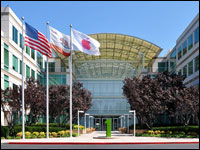
Apple and IBM have delivered the first batch of enterprise-class apps for iOS, rolling out 10 apps that cover key industry verticals like banking and finance, travel and transportation, retail, insurance, telco and government. The companies have pledged to deliver more than 100 such apps.
The apps are the first proof point in the “unprecedented” partnership, which IBM and Apple announced this summer with few details and vague promises, such as forging Apple’s “legendary user experience” with IBM’s “unmatched position in enterprise computing.” While those phrases seem hyperbolic, they’re pretty much spot-on true.
Of course, it’s not like Apple’s iPhones and iPads aren’t already in the enterprise. iPads are deployed in nearly all Fortune 500 companies and more than 90 percent of the Global 500, according to Apple. In the company’s last financial call with analysts, CFO Luca Maestri rattled off a laundry list of stats:
- 75 percent of U.S. corporate IT buyers planned to purchase iPhones in the December quarter;
- Escalator and elevator manufacturer Schindler had deployed more than 20,000 iPhones and 20 customer apps;
- Baidu had more than 20,000 employees using iPhones, running 30 in-house iOS apps;
- Healthcare leader Sanofi had more than 25,000 iPads and more than 450 in-house apps; and
- Premium eyewear designer Luxottica had deployed more than 10,000 iPads.
While the iPad is a massive winner with consumers, Apple’s iPad usage in enterprises strolls easily into the millions, too. Some of Apple’s enterprise success comes from large companies rolling out thousands of devices along with a strategic effort to deliver their own apps.
Yet Apple owes much of its enterprise success to consumers. Millions of people bought iPhones for personal use, and then started bringing them to work, eventually fueling the Bring Your Own Device movement and forcing the hand of IT departments around the world to support Apple.
Remember how IT managers were kicking and screaming about the lack of control they had over iPhones? The difficulty in finding ways to satisfactorily secure them, much less wipe them if they were stolen? The confusion over how to develop their own apps, roll them out, support it all?
Apple has been quietly addressing those issues over the span of years, so much so that iPhones and iPads are relatively easy to roll out, secure and maintain. Different IT departments with different budgets and IT competencies and industry needs may see this differently — but the point is, iOS in the enterprise is now much better than it used to be.
I believe it’s even better than Apple’s current “IT” reputation might make it out to be. Enterprise IT departments — especially large ones — are used to asking for and demanding specific features or enhancements, while Apple’s reputation is to do whatever the heck Apple wants to do, customer desires be damned.
As for simple communication with customers, Apple’s secretive nature has a tendency to annoy CIOs who have to plan for long-term solutions. Apple’s strength never has been transparency about future directions.
IBM, on the other hand, hands out non-disclosure agreements like candy, sharing all manner of important details as it pursues multimillion dollar contracts around the world.
A Whole New Level of Enterprise Transformation
Right now, Apple seems far more serious about its relationship with IBM than this summer’s cordial announcement seemed to imply — and at the same time, Apple’s new AppleCare for Enterprise service offering is taking on support for shared customers with IBM, plus promises to buddy up with enterprise customers. “Our team of experts, side by side with yours,” Apple’s site notes.
Enterprise customers will get a “personal liaison” with AppleCare — a real human they can work with again and again instead of simple access to a faceless bank of experts.
Apple goes on: “You’ll get IT department-level support by phone or email for all Apple hardware and software. We’ll provide support for complex deployment and integration scenarios, including MDM and Active Directory. And if you need help with IBM MobileFirst for iOS apps, we’ll help troubleshoot your solution and work with IBM to get your issue resolved.”
As for hardware, both Apple and IBM get in on the service: “AppleCare for Enterprise will help get you back up and running quickly. IBM’s Global Technology Services, a worldwide Apple Authorized Service Provider, will provide on-site service within the next business day.” Additionally, a business could replace up to 10 percent of its covered iPad and iPhone devices due to employees damaging them.
Consumer Marketing for IT Customers
What I’m seeing now is an extraordinary transformation — Apple seems to be applying its incredible consumer marketing acumen to the enterprise.
Apple’s new Apple + IBM splash page for the new iOS apps is a fully realized marketing pitch for complex solutions that are actually sold by IBM. It’s designed to open your eyes to the possibilities for running customizable enterprise apps for industry verticals that tap into IBM’s data analytics solutions and keep everything super secure.
Unprecedented, indeed.
If you haven’t checked out Apple’s iPad in Business pages, you need to — it’s built with an approachable consumer flair that covers security, management and deployment. Apple has gone from being relatively passive about IT sales to being far more proactive.
Of course, let’s not get carried away: Apple hasn’t trotted out a proverbial Enterprise IT Suggestion Box, but clearly there’s some transformative action churning away here — complex, enterprise IT, business-focused “solution” selling. Apple not only appears to be taking its relationship with IBM seriously, but also seems to be seriously changing its interest in how it sells into enterprises: I think we’ll be seeing a far more business-proactive Apple heading into 2015.





















































